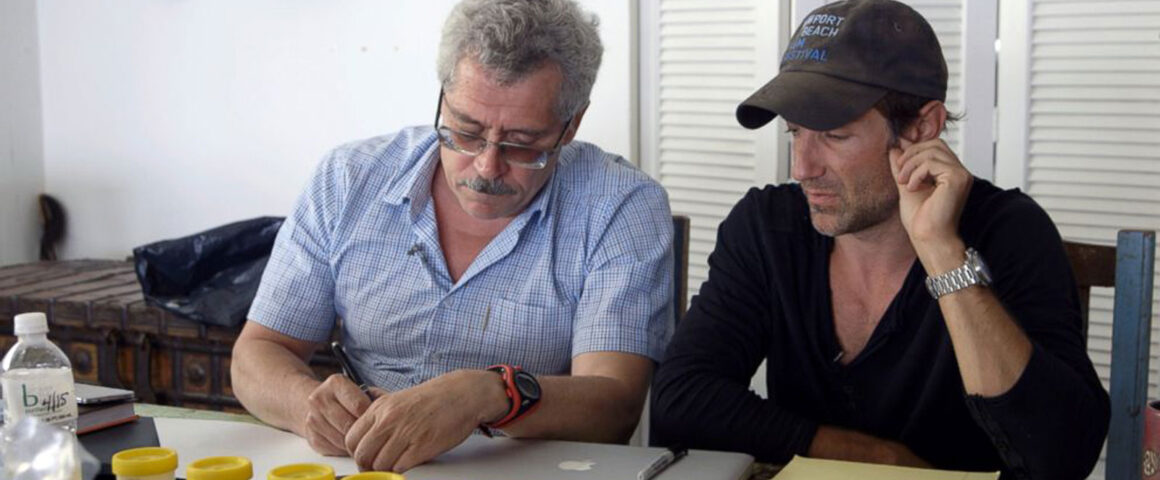In Icarus, documentarian and amateur cyclist Bryan Fogel sets about a steep undertaking. He is curious to learn whether he can follow a blood-doping program capable of clearing the controls clean and thus placing him in awards contention at France’s Haute Route race, the world’s most prestigious multi-day event for amateur riders. Eager to prove his theory that the system in place to drug test athletes is bullshit, Bryan is put in touch with Dr. Grigory Rodchenkov, the head of Russia’s anti-doping laboratory. Throughout 2014, Grigory remotely and gleefully monitors Bryan’s levels and progress via Skype calls and smuggled samples. Narrowly focused on his con and contest, Bryan places himself at the center of this story. That is until it takes a turn far more drastic than any hairpins of the Haute Route.
The following year, Dr. Rodchenkov’s lab came under fire, and its accreditation was suspended by the World Anti-Doping Agency (WADA). The lab was forced to shut down and Grigory to resign. Fogel, realizing the much greater story unfolding in real time, skillfully shifts the film’s focus from smuggling urine into Russia to extracting Grigory out of the country safely. Having fled his native Russia, leaving his wife and children behind, the former track and field athlete finds himself on the run once more. He hides out at Bryan’s California beach house, receives a federal grand jury subpoena, and blows the whistle on years of state-sponsored doping in an exclusive interview with The New York Times. Amid scandal and perhaps treason, Grigory has transformed from affable cheat to Russia’s Edward Snowden, having somewhat ironically fled the country from which Snowden was granted asylum.
During shockingly candid interviews with Bryan, Grigory delves into details of his means and methodology for successfully avoiding detection during the Sochi Olympics, a winter games for which Russian athletes were awarded a record-high 13 gold medals. During this time obtaining positive results for Russia meant any and all tested samples came back negative. Bryan also secures interviews with investigators within WADA and the International Olympic Committee (IOC) responsible for looking into and penalizing Russia for said scandal.
Set against the backdrop of George Orwell’s 1984, a favorite of Grigory’s that was banned and burned under Stalin, the film employs effective use of doublethink. In the beginning, Grigory is a co-conspirator perpetrating deceit on a global scale. He has always been complicit in state-sponsored doping as head of the lab. However, through the lens of context and circumstance, Grigory is reimagined as a heroic whistleblower. He has always been plagued by guilt and wants expose the criminal conspiracy. By playing with the dystopian plot of 1984, Bryan challenges and reverses the viewer’s own understanding of truth versus fact, especially when it comes to Grigory’s complicity in this criminal conspiracy. And just like that, what we thought of Grigory is called into question. As we see him grappling with the sudden and mysterious death of a dear colleague, we (along with him) are forced to reckon with the full scale of what he has done and the imminent danger he is in.
Like the novel, Icarus — nominated for Documentary Feature at next month’s Academy Awards and now streaming on Netflix — makes the distinction between truth (the actual issues and circumstances of an event) and fact (what are believed to be the issues and circumstances of an event) and then explores the social-political-ethical-moral nuances of the manipulation of facts in order to control individuals and societies for political gain. In archival footage, Putin weaponizes “doublethink” as he advocates for justice independent from politics, his every word eerily resounding like an indication of and misdirection from the 2016 election meddling to come.
During one talking head, former WADA president Dick Pound questions, “Why would I watch an event that’s fixed?” In a way, Fogel sees this as a directive, a challenge. Traditionally, documentary is a fixed event. The information is already out in the world, existing for all to know. Despite these constraints or perhaps because of them, Fogel crafts a suspenseful thriller from this presently occurring and prescient scandal. By filming contemporaneously and following each twist and turn in the story, Fogel proves that people don’t watch for displays of excellence or meritocratic victories. We tune in for the drama.
Speaking of which, the film’s title, Icarus, is one of dramatic irony. Mixed metaphors aside, if Grigory is not Orwell’s Winston, then the Russian Federation is certainly not Icarus. All evidence (and Grigory’s testimony) pointed to a longtime conspiracy of state-sponsored cheating. WADA confirmed such findings in its investigation, only to have the Olympic Committee ignore its retaliatory recommendations, and allow Russian athletes the opportunity to compete in Rio. The Russians did not tragically suffer failure at the hands of hubris. They got away with it. While poor Icarus, having ignored his father’s prognostications, flew too close to the sun and died of his own over-ambition. With his excellent and ambitious documentary, Fogel narrowly avoids the sun and such a fate.




'Movie Review: Icarus (2017)' has no comments